 Petzlover
Petzlover Skye Terrier is originated from United Kingdom but Valley Bulldog is originated from Canada. Skye Terrier may grow 19 cm / 7 inches shorter than Valley Bulldog. Skye Terrier may weigh 18 kg / 39 pounds lesser than Valley Bulldog. Skye Terrier may live 3 years more than Valley Bulldog. Skye Terrier may have less litter size than Valley Bulldog. Skye Terrier requires Moderate Maintenance. But Valley Bulldog requires Low Maintenance
Skye Terrier is originated from United Kingdom but Valley Bulldog is originated from Canada. Skye Terrier may grow 19 cm / 7 inches shorter than Valley Bulldog. Skye Terrier may weigh 18 kg / 39 pounds lesser than Valley Bulldog. Skye Terrier may live 3 years more than Valley Bulldog. Skye Terrier may have less litter size than Valley Bulldog. Skye Terrier requires Moderate Maintenance. But Valley Bulldog requires Low Maintenance
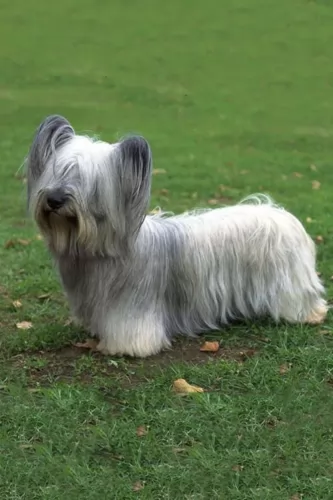 The Skye Terrier is a hardy dog breed and is actually considered to be an endangered native dog breed in the United Kingdom.
The Skye Terrier is a hardy dog breed and is actually considered to be an endangered native dog breed in the United Kingdom.
They were found on the Isle of Skye, although there is some confusion about its history. They were used long ago to hunt but these days they are essentially companion dogs.
They found their way to America and the Skye Terrier Club of America was founded in 1938. The American Kennel Club recognized the breed in 1887.
 The Valley Bulldog originates from Nova Scotia, Canada. It is thought that the Boxer, English Bulldog and the Olde English Bulldogge have been used to bring about the Valley Bulldog.
The Valley Bulldog originates from Nova Scotia, Canada. It is thought that the Boxer, English Bulldog and the Olde English Bulldogge have been used to bring about the Valley Bulldog.
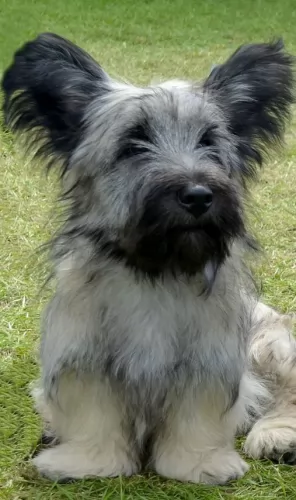 The Skye Terrier is a medium-sized dog standing at between 23 and 26cm in height and weighing between 12 and 18kg. The legs are short and sturdy. He is double coated with the top coat being straight and hard and forming a beard around the face area. The coat can be fawn, and in various shades of grey which are sometimes even black. The ears of the dog are medium sized and erect.
The Skye Terrier is a medium-sized dog standing at between 23 and 26cm in height and weighing between 12 and 18kg. The legs are short and sturdy. He is double coated with the top coat being straight and hard and forming a beard around the face area. The coat can be fawn, and in various shades of grey which are sometimes even black. The ears of the dog are medium sized and erect.
The Skye Terrier has always been a hunting dog and he enjoys quite a bit of exercise – walks, ball games as well as indoor games. Small though he may be, he is strong willed with a mind of his own and will benefit from being trained and socialized.
This is also necessary as he has a fairly reserved nature. He gets on well with children and makes an excellent family pet but he is ready to take on smaller pets in the home. He will bark when confronting strangers and makes an excellent watchdog too.
He is able to adapt well into life in the city or the countryside. He isn’t a dog to be left outside day after day and will just die of boredom, frustration and loneliness.
 The Valley Bulldog stands at between 36 and 46cm in height and he weighs in the region of 18 – 36kg. He is actually a taller version of an English Bulldog.
The Valley Bulldog stands at between 36 and 46cm in height and he weighs in the region of 18 – 36kg. He is actually a taller version of an English Bulldog.
He is muscular and sturdy and has the true broad head of which the Bulldog is so familiar. He has small to medium floppy ears and a stump of a tail. He also has the flat muzzle.
The dog’s coat is short and smooth, making him fairly low maintenance, although he is a moderate shedder. It comes in typical Bulldog shades – tan, white, red, black and brindle.
The Valley Bulldog has an excellent nature, being completely non-aggressive, and when he has been trained and socialized you get a superb pet.
He’s intelligent so you won’t have any trouble learning any basic commands. He is able to get along with other pets in the home. He can be quite entertaining too as he becomes clownish, loving to be around his human family. He is also capable of being calm and gentle.
He makes a splendid playmate for children, loving the games as he is quite an energetic dog. He isn’t suited to life in a tiny home in the city because he loves to just run sometimes, and then he can be like a bull in a china shop.
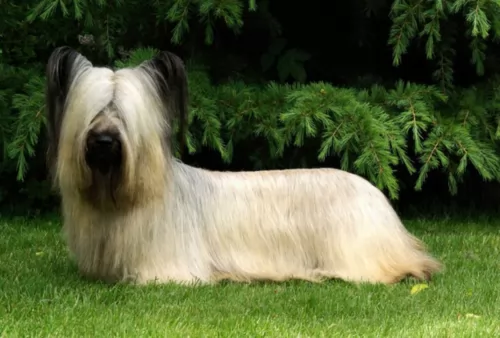 Give the Skye Terrier the attention he wants and he will reward you with his loving companionship.
Give the Skye Terrier the attention he wants and he will reward you with his loving companionship.
He loves the entire family but is best suited to homes where children have been taught to be kind to animals and to treat them with respect.
He has moderate energy levels and will expect you to give him a fair amount of exercise. The Skye Terrier can make an excellent companion for you and your family.
 The Valley Bulldog is guaranteed to make you a splendid pet because he has such a sweet temperament.
The Valley Bulldog is guaranteed to make you a splendid pet because he has such a sweet temperament.
He is such a social, playful dog too. Because of his intelligence, you won't have any trouble teaching him some basic commands. You’ll be amused and entertained by this wonderful dog in your life as his warm personality will ensure you have a true friend in him.
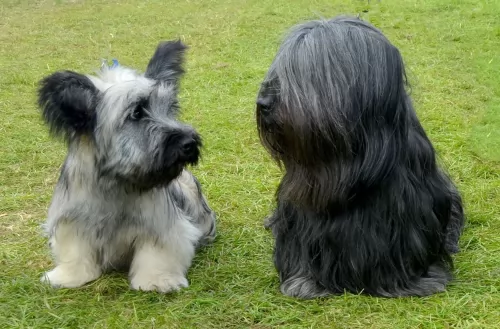 The Skye Terrier is a healthy dog breed. Perhaps the only issue that could be a problem with him is orthopedic problems. He is an achondroplastic dog, meaning a large body on small legs.
The Skye Terrier is a healthy dog breed. Perhaps the only issue that could be a problem with him is orthopedic problems. He is an achondroplastic dog, meaning a large body on small legs.
He could develop spinal problems if he were allowed to constantly be jumping off beds and high chairs.
Orthopedic problems affect the bones, muscles and joints and can actually be debilitating. Orthopedic conditions can be ligament tears or hip dysplasia for instance, accompanied by arthritis.
You’ll notice your dog has an abnormal way of walking or running, inability to get up once lying down and he may have arthritis and pain.Be careful because obesity can trigger problems with the joints and bones.
 It can be sad watching a dog becoming less mobile as joint problems set in. The vet can recommend a diet which can help to manage joint disease. Also, the pain associated with joint problems can be debilitating for your pet and you will want to get your pet to the vet so the pain can be managed.
It can be sad watching a dog becoming less mobile as joint problems set in. The vet can recommend a diet which can help to manage joint disease. Also, the pain associated with joint problems can be debilitating for your pet and you will want to get your pet to the vet so the pain can be managed.
These dogs have quite a few folds around the face and these areas need to be kept clean and dry. An overweight Valley Bulldog should be avoided at all costs as this can put additional weight on the joints.
This is a Brachycephalic breed so they tend to battle with breathing, particularly when they are stressed, agitated or hot. Sometimes these dogs will even gag so as to clear their airway.
Watch for coughing and choking. Such difficulties can be life-threatening for your Valley Bulldog so it is important to recognize respiratory problems with your dog.
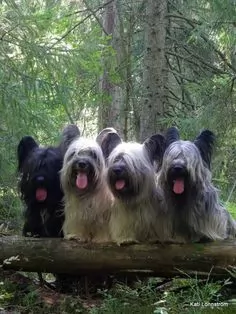 ● The coat of the Skye Terrier is long and silky and will most certainly require brushing every day if you keep the hair long. Such silky hair can easily become matted.
● The coat of the Skye Terrier is long and silky and will most certainly require brushing every day if you keep the hair long. Such silky hair can easily become matted.
● Little dogs like this will need their teeth being checked regularly. You can even try to buy special pet toothpaste and toothbrush and brush his teeth yourself. If you prefer, a professional dog groomer can do this for you and at the same time trim his nails and check his ears and clean the insides of the ears too to avoid infection.
● Provide him with top quality food as the quality of the dog food you buy makes a huge difference to his health and longevity. He is a small dog and there are some excellent commercially manufactured dog foods specially made for small, energetic dogs.
Try to include some home-made food for him which can be simply mixed into the dry kibble twice a week. Boiled chicken, brown rice or pasta and spinach, sweet potatoes and carrots is super tasty and nutritious. Ensure there is always a bowl of fresh, cool water within his reach.
● Keep his vaccines up to date against some deadly canine diseases, and get him to the vet when he shows signs of illness.
 You need to be careful with a bulldog as they have sensitive stomachs and are prone towards indigestion and flatulence. They will certainly need to avoid some foods and you also want to avoid obesity at all costs. The wrong foods can also cause allergic reactions as well as dermatitis which can be very painful and frustrating.
You need to be careful with a bulldog as they have sensitive stomachs and are prone towards indigestion and flatulence. They will certainly need to avoid some foods and you also want to avoid obesity at all costs. The wrong foods can also cause allergic reactions as well as dermatitis which can be very painful and frustrating.
If you have a Valley Bulldog, for your own peace of mind, speak to your veterinarian or a dog expert about the best foods for a bulldog and also the amount to feed. There are some foods that are totally toxic to bulldogs. Make sure your Valley Bulldog always has a bowl of fresh, cool water available that is easy to reach.
Have grooming sessions with your bulldog where you check inside his ears, inside his mouth for bad teeth and check his eyes and face. His nails will also need to be trimmed.
These dogs are more active than you think but you need to be careful that the exercise isn’t too strenuous. He isn’t the kind of dog that will do well with running next to you as you cycle.
Rather take him on a walk every day and give him some ball games in the garden where you can throw him a ball or allow him to pull on a rope.